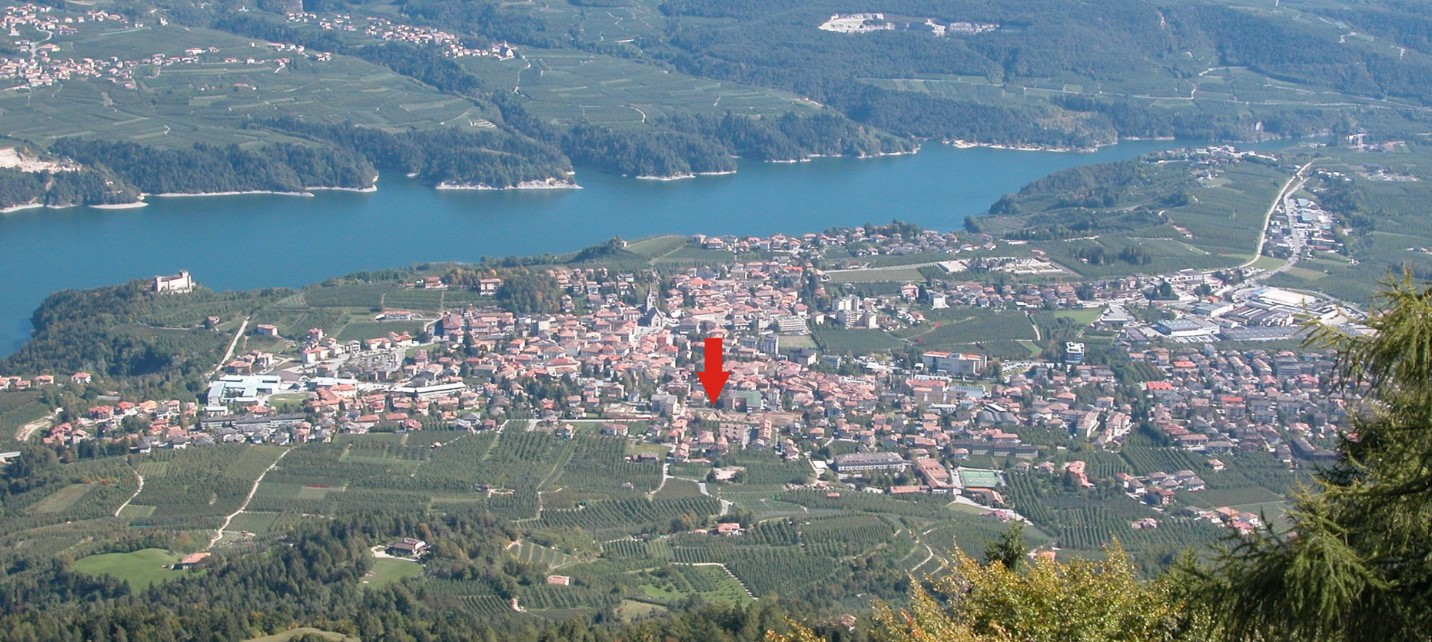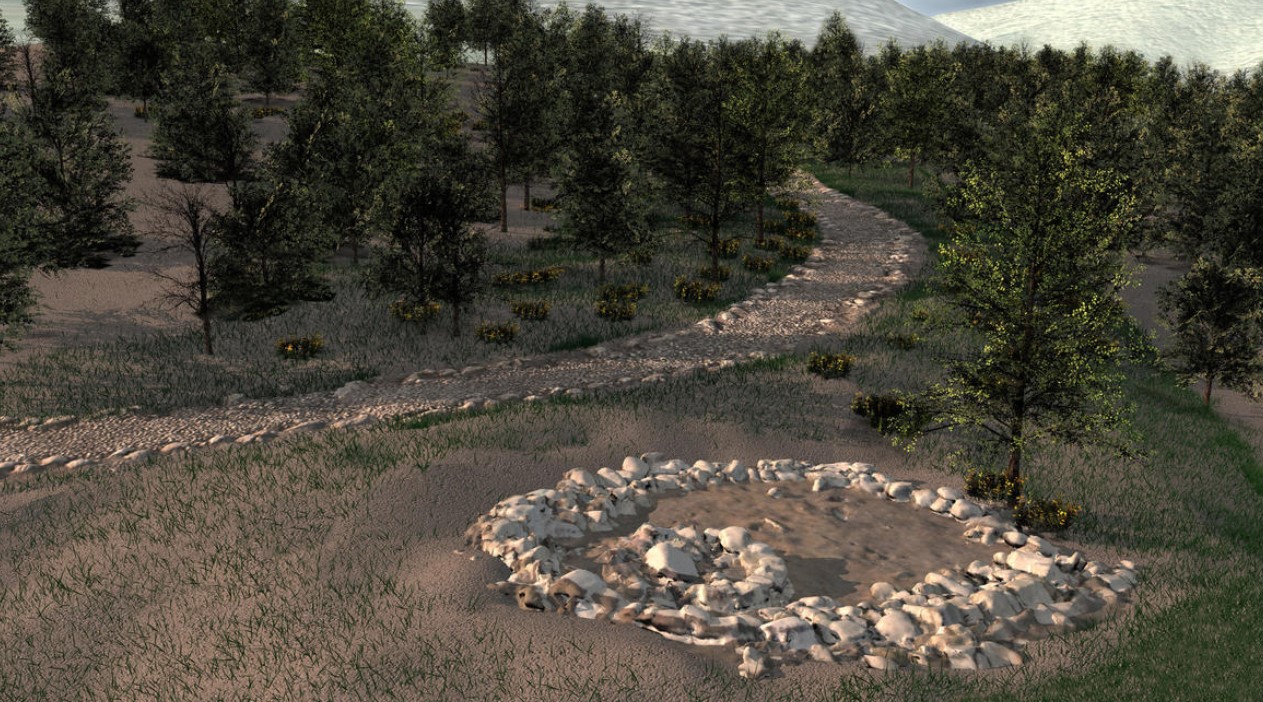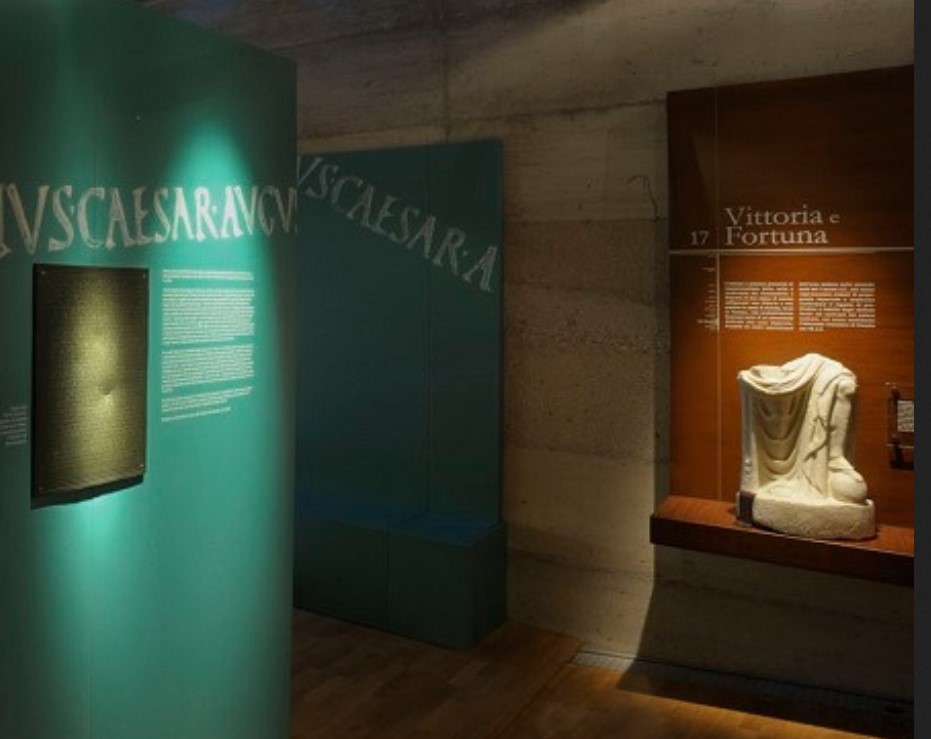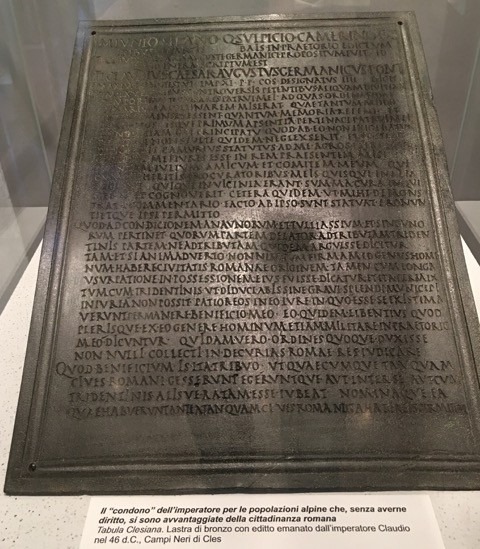

Explore Italy by place | region | time period
Roman Empire » Cles (Campi Neri, Trento, Trentino)

Campi Neri (black lands) is a locality that is situated downstream from Cles' historic center in Val di Non. A significant set of finds from prehistory to Roman times has been unearthed since the early 1800s, and it has been known since then. Ancient objects, including inscriptions dedicated to the god Saturn, had been found. In 1869, a laborer digging a lime pit he discovered a rectangular bronze plate (49.9 x 37.8 cm, 7.14 kg).

... a plate had been placed horizontally with the characters facing down at the bottom of the pit, at a depth of 65 centimeters. Two rusty tips of a javelin, a place of worship used for sacrifices, and other small silver objects were found near it.

It was the Tabula Clesiana (or Anaunian tablet or edictum Claudi de civitate Anaunorum)and records the edict issued by Claudius (Tiberius Claudius Caesar Augustus Germanicus) in 46 CE granting Roman citizenship to the groups settled in Val di Non (Anauni, Sinduni and Tulliasses) with retroactive effect, and dealing with the controversy between the Comenses and the Bergaleos.
The Romans considered those inhabitants to be peregrini (foreigners), but despite this, some of them had begun to adopt Roman customs and practices, even though they did not actually have citizenship. Some had made careers in the army, becoming legion commanders; others were Praetorians (the emperor's bodyguards), while still others were even judges in Rome.
Roman citizenship was a coveted status in the ancient world, granting individuals a range of privileges and solidifying their place in Roman society.
It offered a more secure life: legal and social advantages; protection under Roman law; right to own land; tax exemptions; right to marry; voting rights; eligibility for public office; military opportunities like to serve in the prestigious Roman legions, ...
It's no wonder it was such a coveted status for people from conquered or allied territories.
Roman citizenship wasn't readily available to everyone at first. However, over time, the Romans became more flexible. The Edict of Caracalla (212 AD) marked a turning point. This decree granted citizenship to all freeborn inhabitants of the empire, significantly expanding the pool of citizens.

Today, the Tabula is preserved at the Castello del Buonconsiglio (Castle of good advice) Museum in Trento. It is the first evidence of the introduction of delatores in the fiscal controversy from the point of view of the Roman law, but mostly it is an important evidence of the rapid assimilation of the populations of ancient Alpine peoples into the Roman world.
The Tabula Clesiana had the same effect after eighteen centuries. Trentino, after being part of the Kingdom of Bavaria, was annexed to the Kingdom of Italy by decision of Napoleon Bonaparte in 1810, but then became part of the Austrian Empire, creating dissatisfaction among the Italian-speaking population who felt like a marginalized minority. A movement (irredentism) was born, which aimed to obtain annexation to the Kingdom of Italy. The Treaty of Vienna (1866) closed the Third Italian War of Independence and Trentino remained Austrian as part of Tyrol. Three years later, the discovery of the Tabula, which essentially stated that Trentino had been part of the Roman Empire, had a strong resonance on the Italian minority. After the World War I, the region was ceded to Italy with the dissolution of the Austro–Hungarian Monarchy.

M٠IVNIO٠SILANO٠Q٠SVLPICIO٠CAMERINO٠COS
IDIBVS٠MARTIS٠ BAIS٠IN٠PRAETORIO٠EDICTVM
TI٠CLAVDI٠CAESARIS٠AVGVSTI٠GERMANICI٠PROPOSITUM٠FVIT٠ID
QVOD٠INFRA٠SCRIPTVM٠EST
TI٠CLAVDIVS٠CAESAR٠AVGVSTVS٠GERMANICVS٠PONT
MAXIM٠TRIB٠POTEST٠VI٠IMP٠XI٠P٠P٠COS٠DESIGNATVS٠IIII٠DICIT
CVM٠EX٠VETERIBVS٠CONTROVERSIS٠PETENTIBVS٠ALIQVAMDIV٠ETIAM
TEMPORIBVS٠TI٠CAESARIS٠PATRVI٠MEI٠AD٠QVAS٠ORDINANDAS
PINARIVM٠APOLLINAREM٠MISERAT٠QVAE٠TANTVM٠MODO
INTER٠COMENSES٠ESSENT٠QVANTVM٠MEMORIA٠REFERO٠ET
BERGALEOS٠ISQVE٠PRIMVM٠APSENTIA٠PERTINACI٠PATRVI٠MEI
DEINDE٠ETIAM٠GAI٠PRINCIPATV٠QVOD٠AB٠EO٠NON٠EXIGEBATVR
REFERRE٠NON٠STVLTE٠QVIDEM٠NEGLEXSERIT٠ET٠POSTEAC
DETVLERIT٠CAMVRIVS٠STATVTVS٠AD٠ME٠AGROS٠PLEROSQVE
ET٠SALTVS٠MEI٠IVRIS٠ESSE٠IN٠REM٠PRAESENTEM٠MISI
PLANTAM٠IVLIVM٠AMICVM٠ET٠COMITEM٠MEVM٠QVI
CVM٠ADHIBITIS٠PROCVRATORIBVS٠MEIS٠QVISQVE٠IN٠ALIA
REGIONE٠QVIQVE٠IN٠VICINIA٠ERANT٠SVMMA٠CVRA٠INQVI
SIERIT٠ET٠COGNOVERIT٠CETERA٠QVIDEM٠VT٠MIHI٠DEMONS
TRATA٠COMMENTARIO٠FACTO٠AB٠IPSO٠SVNT٠STATVAT٠PRONVN
TIETQVE٠IPSI٠PERMITTO
QVOD٠AD٠CONDICIONEM٠ANAVNORVM٠ET٠TVLLIASSIVM٠ET٠SINDVNO
RVM٠PERTINET٠QVORUM٠PARTEM٠DELATOR٠ADTRIBVTAM٠TRIDEN
TINIS٠PARTEM٠NE٠ADTRIBVTAM٠QVIDEM٠ARGVISSE٠DICITVR
TAM٠ET٠SI٠ANIMADVERTO٠NON٠NIMIVM٠FIRMAM٠ID٠GENVS٠HOMI
NVM٠HABERE٠CIVITATIS٠ROMANAE٠ORIGINEM٠TAMEN٠CVM٠LONGA
VSVRPATIONE٠IN٠POSSESSIONEM٠EIVS٠FVISSE٠DICATVR٠ET٠ITA٠PERMIX
TVM٠CVM٠TRIDENTINIS٠VT٠DIDVCI٠AB٠IS٠SINE٠GRAVI٠SPLENDI٠MVNICIPI
INIVRIA٠NON٠POSSIT٠PATIOR٠EOS٠IN٠EO٠IVRE٠IN٠QVO٠ESSE٠SE٠EXISTIMA
VERVNT٠PERMANERE٠BENIFICIO٠MEO٠EO٠QVIDEM٠LIBENTIVS٠QVOD
PLERISQVE٠EX٠EO٠GENERE٠HOMINVM٠ETIAM٠MILITARE٠IN٠PRAETORIO
MEO٠DICVNTVR٠QUIDAM٠VERO٠ORDINES٠QVOQVE٠DVXISSE
NON٠NVLLI٠COLLECTI٠IN٠DECVRIAS٠ROMAE٠RES٠IVDICARE
QVOD٠BENIFICIVM٠IS٠ITA٠TRIBVO٠VT٠QVAEQVMQVE٠TANQVAM
CIVES٠ROMANI٠GESSERVNT٠EGERVNTQVE٠AVT٠INTER٠SE٠AVT٠CVM
TRIDETINIS٠ALISVE٠RATAM٠ESSE٠IVBEAT٠NOMINAQVE٠EA
QVAE٠HABVERVNT٠ANTEA٠TANQVAM٠CIVES٠ROMANI٠ITA٠HABERE٠IS٠PERMITTAM
M(arco) Iunio Silano Q(uinto) Sulpicio Camerino co(n)s(ulibus)
Idibus Marti(i)s Bai(i)s in praetorio edictum
Ti(beri) Claudi Caesaris Augusti Germanici propositum fuit id
quod infra scriptum est
Ti(berius) Claudius Caesar Augustus Germanicus pont(ifex)
maxim(us) trib(unicia) potest(ate) VI imp(erator) XI p(ater) p(atriae) co(n)s(ul) designatus IIII dicit
cum ex veteribus controversis petentibus aliquamdiu etiam
temporibus Ti(beri) Caesaris patrui mei ad quas ordinandas
Pinarium Apollinarem miserat quae tantum modo
inter Comenses essent quantum memoria refero et
Bergaleos isque primum apsentia pertinaci patrui mei
deinde etiam Gai principatu quod ab eo non exigebatur
referre non stulte quidem neglexserit et posteac
detulerit Camurius Statutus ad me agros plerosque
et saltus mei iuris esse in rem praesentem misi
Plantam Iulium amicum et comitem meum qui
cum adhibitis procuratoribus meis quisque in alia
regione quique in vicinia erant summa cura inquisierit
et cognoverit cetera quidem ut mihi demonstrata
commentario facto ab ipso sunt statuat pronuntietque
ipsi permitto
quod ad condicionem Anaunorum et Tulliassium et Sindunorum
pertinet quorum partem delator adtributam Tridentinis
partem ne adtributam quidem arguisse dicitur
tam et si animadverto non nimium firmam id genus hominum
habere civitatis Romanae originem tamen cum longa
usurpatione in possessionem eius fuisse dicatur et ita permixtum
cum Tridentinis ut diduci ab i(i)s sine gravi splendi municipi(i)
iniuria non possit patior eos in eo iure in quo esse se existimaverunt
permanere benificio meo eo quidem libentius quod
plerisque ex eo genere hominum etiam militare in praetorio
meo dicuntur quidam vero ordines quoque duxisse
non nulli collecti in decurias Romae res iudicare
quod benificium i(i)s ita tribuo ut quaecumque tanquam
cives Romani gesserunt egeruntque aut inter se aut cum
Tridentinis alisve ratam esse iubeat nominaque ea
quae habuerunt antea tanquam cives Romani ita habere i(i)s permittam.
Edict of Tiberius Claudius Caesar Augustus Germanicus, consulship of Marcus Junius Silanus and Quintus Sulpicius Camerinus. Ides of March, Baiae, in the praetorium Tiberius Claudius Caesar Augustus Germanicus, Pontifex Maximus, tribune for the sixth time, imperator for the eleventh time, father of the country, consul designate for the fourth time, declares:
Whereas there have been longstanding disputes pending since ancient times, even during the reign of my uncle Tiberius Caesar, for which he had sent Pinarius Apollinaris to settle them, which concerned only the Comenses, as far as I remember, and the Bergalei, who, first due to the absence of my tenacious uncle, then also during the principate of Gaius, not demanding it from him, neglected to report not without reason and subsequently Camurius Statutus denounced to me that many fields and pastures of my property were at that time in the possession of the Trentini, I sent my friend and companion Julius Planta, who, with the assistance of my procurators, both in other regions and in the vicinity, with the utmost care investigated and learned that everything else, as has been demonstrated to me with a report drawn up by him, he should establish and pronounce, I leave it to him.
As for the condition of the Anauni, the Tulliates and the Sinduni, a part of whom the accuser says were attributed to the Trentini, while the other part does not even say were attributed, although I realize that that kind of people does not have a very solid origin in Roman citizenship, however, since it is said that they have been in possession of it for a long usurpation and so mixed with the Trentini that I cannot bear for them to be separated from them without serious injustice for the splendid municipality, I allow them to remain in the same right in which they believed themselves to be, thanks to my benefit, all the more willingly since it is said that some of that kind of people have also served in my praetorium, some even commanded troops, not a few gathered in decuries in Rome to judge cases, which benefit I grant them in such a way that everything they have done and acted as Roman citizens, both among themselves and with the Trentini or others, I consider valid and allow them to have the same names that they had before as Roman citizens.
In order to know more, you can visit:
- Wikipedia: [1]
- Corpus Inscriptionum Latinarum V 5050—ILS 206
This page was last edited on 20 June 2024

Open in Google Maps and find out what to visit in a place.
Go to: Abruzzo | Aosta Valley | Apulia | Basilicata | Calabria | Campania | Emilia Romagna | Friuli Venezia Giulia | Lazio | Liguria | Lombardy | Marche | Molise | Piedmont | Sardinia | Sicily | South Tyrol | Trentino | Tuscany | Umbria | Veneto

Text and images are available under the Creative Commons Attribution-ShareAlike License 4.0; - italystudynotes.eu - Privacy